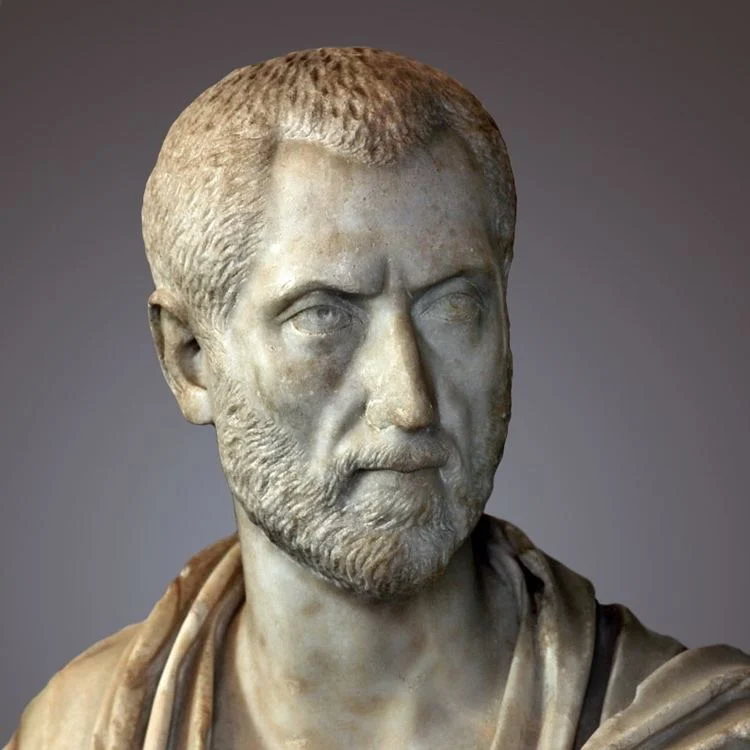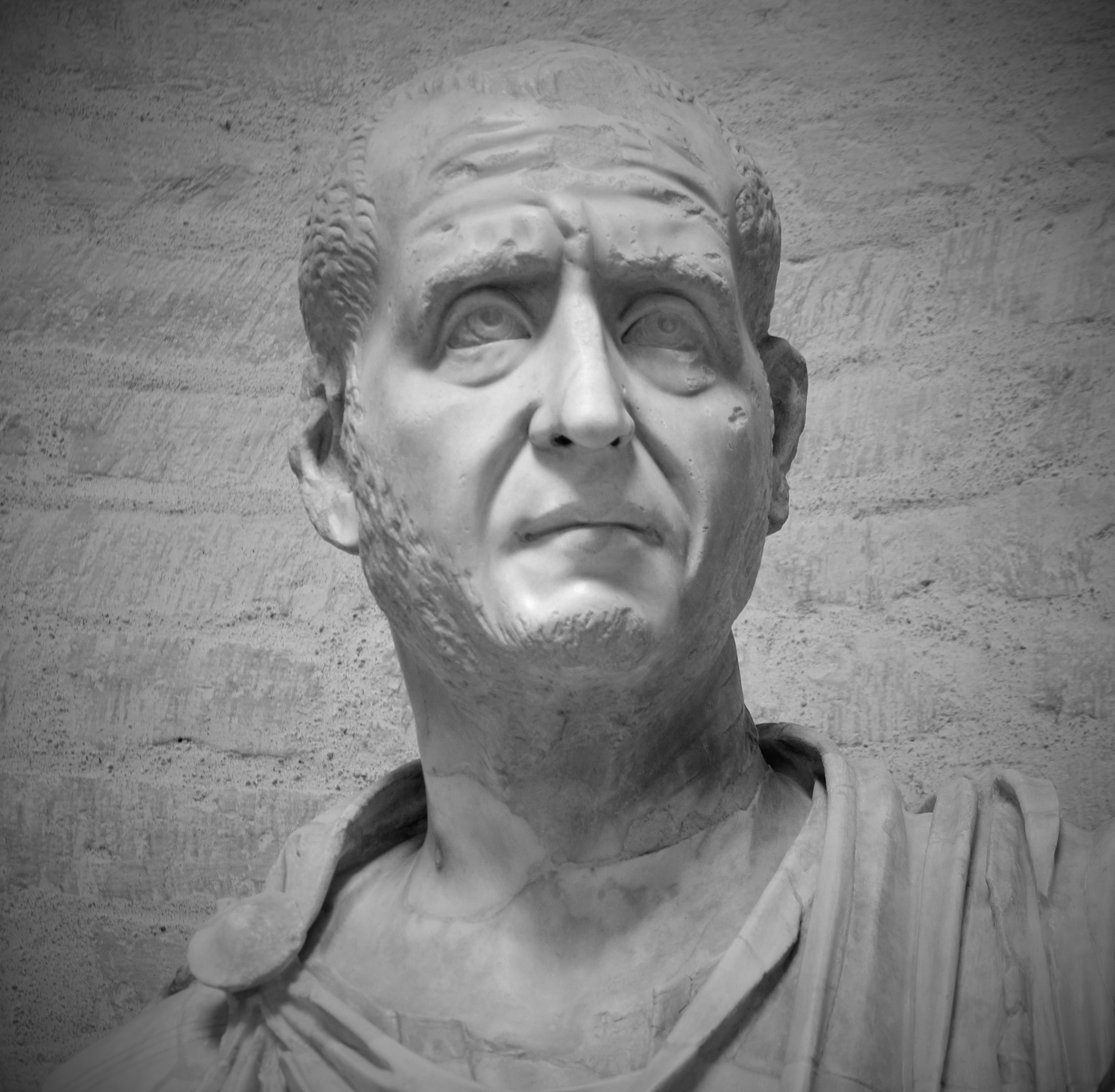Podcast: Play in new window | Download
Subscribe: Spotify | Email | RSS

Novatian was executed by the Roman government in 258. This ended an interesting career.
After an emergency baptism when he was sick, Novatian became a priest and a leading theologian at Rome. He wrote his book The Trinity as a sort of commentary on traditional Roman baptismal creed, in order to help laypeople steer around docetic, Modalistic Monarchian, and Dynamic Monarchian christologies.
In this episode I discuss the various reactions of Christians to the order of the emperor in 249 to either sacrifice or be executed, and then I explain how Novatian became the leader of a faction of churches in Rome which would not re-admit the “lapsed.” He might have become the bishop of Rome, but later people have sometimes called him an “anti-pope.”
I then summarize his book and the rival theologies to his own brand of 3rd c. logos speculations, and I speculate myself about why he doesn’t use the word trinitas in the book. Finally, since Novatian urges throughout this book that clearly the Son is Deus, I ask what such “Jesus is God” statements mean.
This sets the stage for the next episode, where we dig in to the last two chapters of his book, where he engages with some clear Modalistic Monarchian and Dynamic Monarchian arguments and explains why his own logos theory approach is monotheistic and not polytheistic.
Links for this episode:
Papandrea, Novatian of Rome and the Culmination of Pre-Nicene Orthodoxy

Novatian, The Trinity, The Spectacles, Jewish Foods, In Praise of Purity, Letters
The Treatise of Novatian on the Trinity
Rives, “The Decree of Decius and the Religion of Empire“
podcast 270 – Origen’s “one God”
podcast 334 – “Who do you say I am?”
podcast 12 – the Apostles’ Creed
podcast 316 – Review of Papandrea, Trinity 101: Father, Son, Holy Spirit
podcast 224 – Biblical Words for God and for his Son Part 1 – God and “God” in the Bible
podcast 259 – Who is the one Creator? – Part 2
podcast 258 – Who is the one Creator? – Part 1
This week’s thinking music is the track “Retrospective” by Koi-discovery.

On the one hand, I agree with Vladimir Latinovic, who has argued that Arianism was traditional, while the Nicene theology was the innovation (see the first link below). On the other hand, my own studies have compelled me to realize that the teachings of the ante-Nicene Fathers are too late in both time and intellectual/socio-cultural ‘place’ to tell us what true Apostolic Christology really looked like (see the second link below). So, for me these arguments over what the Fathers thought is interesting from a historical perspective, but irrelevant from a biblical perspective.
https://kazlandblog.wordpress.com/2021/04/20/was-the-nicene-view-the-real-novelty/
https://kazlandblog.wordpress.com/2020/04/17/christology-how-important-are-the-writings-of-the-fathers/
I agree. What, say, Origen thought in c. 240 is about two hundred years removed from Jesus’ ministry. He’s no more an early Christian than I am an early American – this far down in time we lose a realistic perception of these temporal locations. About the earliest Christology, see a forthcoming monograph published by the UCA – God willing, in time for our October conference.
I appreciate that you used my book for the research for your podcast, however I wish you had read it more carefully. Novatian certainly DID believe in the Trinity, and I think the reason he does not use the Latin word is because he saw that “Trinitas” was relatively new at the time (less than 50 years old, which at that time, is pretty new), and perhaps not yet universally accepted as the official term. Had he written in Greek, he could have used “Triados,” but you have to remember that Novatian was only the first or second Church writer after Tertullian to try to write theology in Latin at all. I won’t belabor the point, except to say that I can say with confidence that if Novatian were here today, he would see the phrase “unitarian Christian” as an oxymoron, since to be unitarian is not to be Christian, and to be Christian is to be Trinitarian. And by the way, that image is not an image of Novatian. It’s a bust of an unknown third century Roman, and I used it from time to time on websites related to Novatian, but no one thinks it is meant to be him. In any case, I encourage your listeners to read my books on Novatian if they are interested, but understand that Novatian was acting bishop of Rome in the mid-third century precisely because his theology was thoroughly orthodox, which is to say, Trinitarian. – Jim Papandrea
Thanks for your comment, Dr. Papandrea, and for your good work on Novatian. Yes, I know that you consider Novatian to be a trinitarian. I don’t think we’re really disagreeing much about why he doesn’t use the word “trinitas”. Nor is that the main reason why I think he’s a unitarian instead. The reasons, for me, are (1) that he never mentions a triune/tripersonal God using any word, and (2) he makes pretty clear in the book that for him – as for other early and non-modalist authors, the one true God just is the Father himself, and not also anyone else. As I explain in these episodes, he uses the phrase “Jesus is God” to mean that he is not human only but has a component which is in some sense divine. But he’s clear enough that this one – the divine nature / Logos – lacks a number of the divine attributes, and so is not divine in the way the one true God is divine. In later times his sort of theology would be called “Arian” – or “semi-Arian” because he believes the Logos always existed. You’re certainly right that he was, theologically, in the orthodox/mainstream fold in his time. It’s just that being orthodox in mid-2nd c. did not require believing in a tripersonal God, that somehow “in God” are there co-equally divine Persons. His views are in the same ballpark as Origen and Tertullian – the three greatest beings are, in order, God, the Logos, and the Spirit – but a tripersonal God just isn’t an idea at this time. It is striking too – as I explain in part two of these podcasts – that it seems that Novatian simply endorses as sound the one dynamic monarchian he discusses. That’s because he agreed with them about who the one God is, even while disagreeing with them about the metaphysics of Christ. Do you think that Novatian actually denies a premise of that argument (see part 2 for my analysis of it)?
Dale, I get that you are an apologist for your particular faith tradition – as am I. We both live with the temptation to see what we want to see in the primary sources. I don’t have time to argue this point by point (I’m literally procrastinating a book deadline right this minute), but I have to say that based on all my research, you are utterly wrong about pretty much everything you’re saying. The simplest proof of this, I think, is the fact that Novatian is famous for saying that the real Christ is being crucified again, “between two thieves.” Those two thieves are Sabellianism/modalism on one hand, and adoptionism/dynamic monarchianism on the other. What you call unitarianism is adoptionism, and is one of the “thieves” – one of the main heresies against which Novatian argues. To say that he would fit in at all with any of the Arian factions is complete nonsense and shows that you have let your biases drive how you read (or don’t read) the text. You are missing the nuances of Trinitarianism, which is to say you don’t really understand what Novatian is saying because you are looking at it from the outside. Look again at his exegesis of Philippians 2 – the point being that Christ is God who becomes human, not the other way around. The christology of descent inherent in Trinitarianism is what sets Novatian and the other orthodox theologians apart from the Arians and other adoptionists. The Logos does not lack divine attributes, as you say, but rather sets aside the prerogative to access them for the sake of the kenosis, but the fact that it IS a kenosis (and not something like apotheosis) is the key. Only God can self-limit with regard to divine attributes. Finally, to say that “a tripersonal God just isn’t an idea at this time” is also nonsense, as it already was an “idea” in Irenaeus, Justin, Ignatius, Clement, the Didache, and of course in the New Testament. This tired old argument that somehow the doctrine of the Trinity is a later development is simply wishful thinking on the part of modern day adoptionists. – JP
Pingback: podcast 348 – Novatian’s On the Trinity – Part 2 – Two Thieves and Three Arguments – Trinities
Comments are closed.